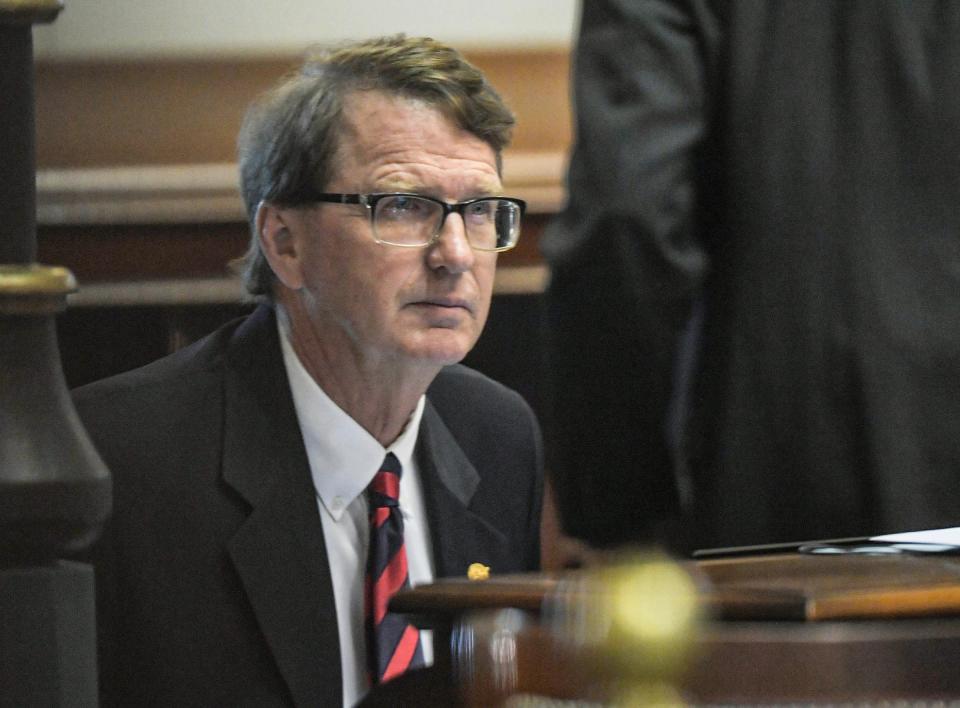No compromise reached, Upstate lawmakers propose near-total abortion bills
A group of six lawmakers met Tuesday to hash out differences between the Senate and House versions of an abortion ban and did not reach a resolution. In a session that ran roughly over an hour, three proposals were put on the table for lawmakers to consider.
At the very offset of the meeting, Sen. Shane Massey said that it was clear to him that the Senate did not have the vote for a ban earlier than six weeks. This essentially made the Senate version, a harsher and more restrictive six-week abortion ban, introduced through Massey's amendment back in September, the first proposal. The Senate's version banned all abortions from week six after conception and included exceptions for pregnancies borne from rape, incest, or if a mother's life was in danger or there were fetal anomalies.
Two proposals by Upstate lawmakers Rep. John McCravy, R-Greenwood and Sen. Richard Cash, R-Anderson, were similar in that they used the House bill as a bedrock. This meant that they were still proposing a law that would ban abortion from the time of conception. However, they had included some of the Senate's language as a proposed compromise.
McCravy's proposal
McCravy introduced his proposal by emphasizing that the abortion bill would not endanger contraception and in-vitro fertilization procedures. Instead, it merely intended to "end the practice of using abortion as birth control at the time of conception." Sen. Margie Bright Matthews said that "abortion as birth control" was not an objective fact, rather it was McCravy's interpretation of statistics provided by the Department of Health and Environment Control.
Previous reporting:SC Supreme Court hears challenge to 6-week abortion law
In terms of compromise, McCravy's proposal adopted Senate definitions of sexual assault and fetal anomaly as well as provisions related to retaining the DNA evidence in pregnancies borne from rape and incest.
He also included a "no-fund proviso," which said that women would not be able to use other sources, such as an abortion fund, to pay for an abortion.
Cash's proposal
The Anderson lawmaker said that he had used the House bill as a foundation.
"It [Cash's proposal] prevents abortion from the time that a pregnancy can be clinically diagnosed, which is fairly close to conception. And so the thrust of this bill all along is to respond to the Dobbs decision," Cash said. "We already had a heartbeat law, so it makes sense that the that the House took action to protect life at a much earlier time, and I have supported the House effort in any in every way," he said, adding that he had supported that bill throughout its journey.

In his proposal, Cash said that he had removed any reference to contraception to avoid controversies that suggested that birth control was in danger. He also added Senate language that prohibited the usage of fetal tissue from an abortion and banned state funding of Planned Parenthood, a proviso that is part of every state budget.
The third and most notable addition was the repeal of Roe’s codification in the state’s law.
The loophole the Senate version fixes
While the Senate version instituted a six-week time period that allowed abortion, it also offered a "fix" for a loophole in the 2021 six-week heartbeat law.
A section in the 2021 law said that the act should not be construed as an effort to repeal the codification of Roe v. Wade in state law, done originally by the South Carolina General Assembly in 1974.
When the SC Supreme Court temporarily blocked the six-week fetal heartbeat bill after the U.S. Supreme Court overturned Roe v. Wade this past summer, the court emphasized the loophole and said the legislature's clear intent to retain the 1974 adoption of the Roe framework alongside the Act "arguably creates a conflict in the law."Both McCravy and Cash added the Senate "fix" to their proposals.
Democrats and the only women in the committee question timing of the meeting
Matthews said that the Oct. 28 notice for the meeting did not give her adequate time to review the language of the proposals.
Rep. Spencer Wetmore, D-Charleston said that she had received the documents only 20 minutes before the meeting and needed time to go over the differences and similarities in Cash and McCravy's proposals.
Matthews was concerned about the provision where a father was asked to provide child support from the time of conception and if that could potentially affect their state insurance and cause an equal protection issue. She asked that if both the mother and father were insured with state-provided insurance, would both the parents be able to provide financial support? Bright Matthews brought up an incident from her life where the state insurance agency told her that only one parent could add a dependent to their insurance.
As the committee considers the proposals, there are several scenarios facing the legislature. Either lawmakers could reach a compromise and send a report back to both chambers for another vote. If the conference committee fails to agree, there is a complicated option where conferees can go back to their respective chambers and request free conference powers, which requires a two-thirds vote of each chamber.
A free conference committee is not limited and could rewrite the bill, however with only 10 weeks until the new session begins, it is unlikely that lawmakers may have the time.
The conference committee will meet again Nov. 9, 2022 at 10 a.m.
This article originally appeared on Greenville News: SC lawmakers propose near-total abortion bills, did not reach resolution

